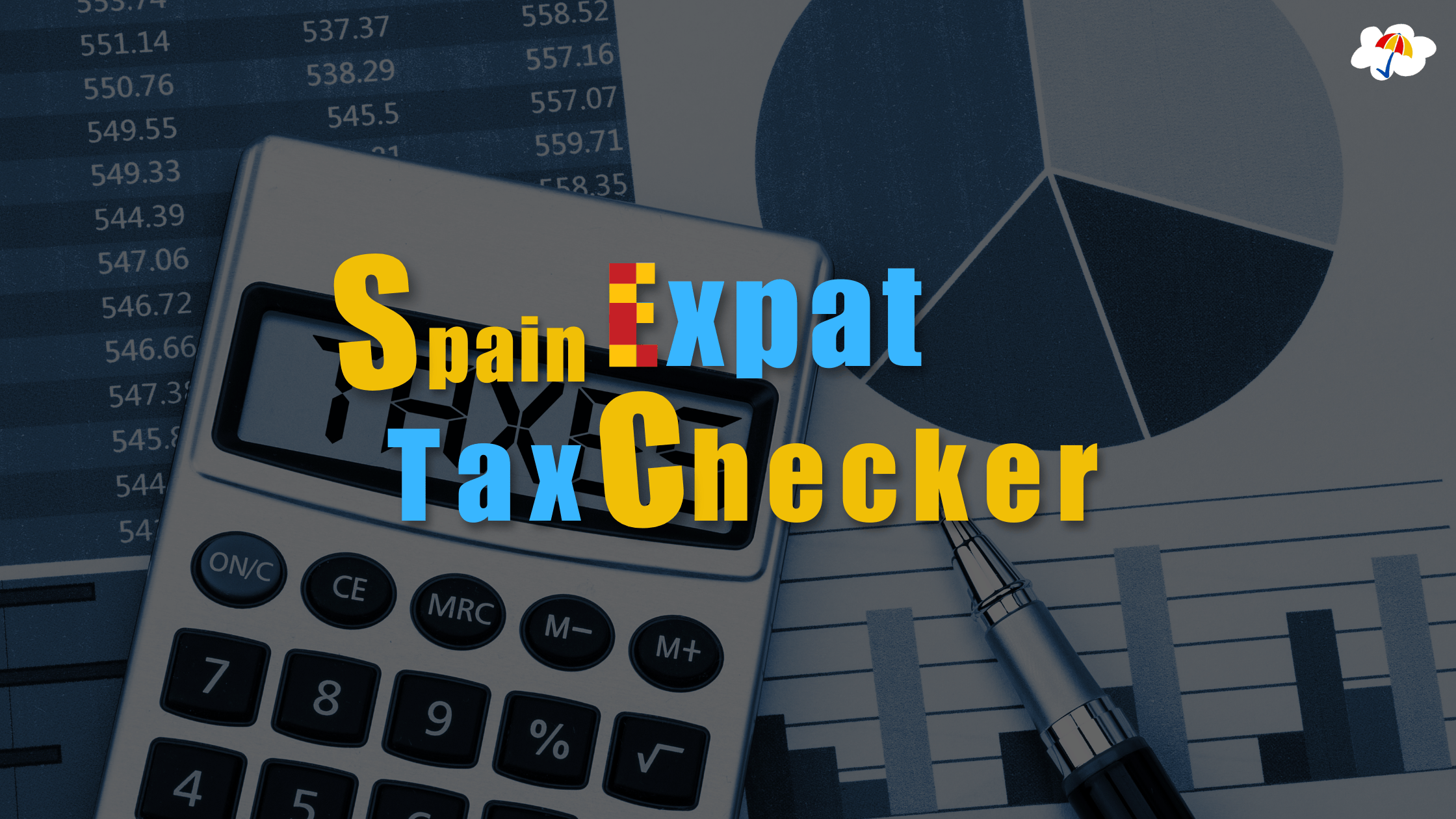Spain Expat Tax Checker

Spain Expat Tax Checker
📋 Get the Tax Checker on your Website as an Embed Code
Calculator Code
Preview
What Does My Tax Status Mean?
I've been living in Spain since 2019, so I'm pretty familiar with the tax forms, progressive taxation and requirements. I've noticed a lot of people on social media asking for help understanding their tax status, mostly expats but also Spanish residents. I understand. Spanish bureaucracy isn't straightforward, but it might be pretty efficient in some cases.
If you're an expat, investor, or professional earning income in Spain, our Spain Expat Tax Checker tool makes it simple to understand your tax obligations. It's designed for non-residents and those eligible for the Beckham Law, including C-level executives, engineers, athletes, and performers. It quickly assesses your tax status based on income, residency, and family circumstances.
You'll be sure to stay on the right side of the law while getting the most out of your tax benefits.
This guide and tax checker will walk you through three key scenarios: the Beckham Law for eligible professionals, tax responsibilities for EU and non-EU residents, and obligations for Spanish tax residents.
Your tax status can be affected by things like your income, where you're from, and who you live with. Our tool will show you what you need to do to stay on the right side of the taxman, saving you time, money, and stress.
Let's look at how you can make sure you're following Spanish tax rules and boosting your after-tax income!

Should You Pay Taxes in Spain?
Whether or not you receive income from Spain, you may still be liable to pay tax here. If you're an expat or a professional working in Spain, understanding your tax obligations can be a challenge. I often see people on social media asking if they have to pay taxes in Spain, especially expats who are unsure of the rules.
The Criteria for Spanish Tax Residency
Are you in Spain for more than 183 days a year?
- More than 183 days: You’re a Spanish tax resident.
- Less than 183 days: You’re likely a non-resident for tax purposes.
Do you have a spouse or children living in Spain?
If the answer is 'yes': This may make you a tax resident, even if you’re physically absent for extended periods.
Is your income from Spain higher than income from your country of residence?
Again, if yes: You might be considered a Spanish tax resident under this criterion.
-

If You’re a Non-EU Resident
Non-EU Residents: Taxed at a 24% flat rate on Spanish income, as they do not benefit from the lower rate applicable to EU citizens.
-

If You’re a Spanish Tax Resident
Once you qualify as a tax resident in Spain, your income worldwide is subject to Spain's progressive tax brackets. These vary by region, so you’ll need to check the specific rates where you’re registered. Spanish residents pay more IRPF tax as income increases, while non-residents are taxed at fixed rates.
-

If You’re an EU Resident
Non Spanish-residents who earn income in Spain are taxed at fixed rates.
EU Residents: Generally taxed at a 19% flat rate on income derived from Spain.
Real-World Scenarios

Non-Spanish Resident, But EU Resident
If you live in an EU country but own property in Spain or receive rental income here, you'll pay tax on this Spanish income at a fixed rate. This rate is generally lower (19%) than for non-EU residents. Note that it shouldn't be higher than your income in your home country, otherwise you'll be taxed as a Spanish resident, and the tax brackets are progressive.

Non-Spanish Resident & Non-EU Resident
Let's say you're a US or UK citizen and you receive income from a Spanish source. You'll also be taxed on that income at a fixed rate, usually higher (24% flat) than for EU residents.

Spanish Resident
If you've moved to Spain and/or meet the residency criteria, you'll be taxed on your worldwide income using progressive tax brackets according to the region in which you're registered/resident. This means that income earned worldwide is aggregated and taxed at increasing rates.
The Criteria for Tax Relief Under the Beckham Law
You must be a professional in one of the following fields
- Actor
- Engineer
- Scientist
- Musician
- Researcher
- Football Player
- Technical Expert
- Basketball Player
- C-level Executive
- Artist or Performer
- Professional Athlete
- Director or Manager
- Consultant or Advisor
- Professor or Academic
- Specialized Consultant or Advisor on International Assignment
No prior Spanish residency in the past 5 years
If you have lived in Spain recently (last 5 years), you can't use this option to claim tax relief under the Beckham Law.
Employed by a Spanish company
You need to be employed here, not just freelance or working for your company.
Register within six months of starting work
You must apply within half a year of beginning your role.
Are You Eligible for Beckham Law Relief?
This entitlement gives you the opportunity to avoid progressive taxation and pay as a non-resident, although you will be working here in Spain.
The backcham law eligibility allow you to pay only a flat rate of 25% on your income.
Basically, the Spanish government is trying to encourage specialists and professionals to make a significant contribution to its economy by offering tax breaks and benefits to such people.

Does Your Country Have a Double Taxation Agreement with Spain?
Double Taxation Agreements (DTAs) can prevent you from paying taxes twice on the same income in Spain and your home country. Here’s how it works:
All Countries With a Double Tax Treaty with Spain
Countries with DTAs with Spain
- Albania
- Germany
- Andorra
- Saudi Arabia
- Algeria
- Argentina
- Austria
- Australia
- Armenia
- Azerbaijan
- Belarus
- Barbados
- Belgium
- Bolivia
- Bosnia and Herzegovina
- Brazil
- Bulgaria
- Cape Verde
- Canada
- Qatar
- Czech Republic
- Chile
- China
- Cyprus
- Colombia
- South Korea
- Costa Rica
- Croatia
- Cuba
- Denmark
- Ecuador
- Egypt
- United Arab Emirates
- Slovakia
- Slovenia
- The United States
- Estonia
- Philippines
- Finland
- France
- Georgia
- Greece
- Netherlands
- Hungary
- India
- Indonesia
- Iran
- Ireland
- Iceland
- Israel
- Italy
- Jamaica
- Japan
- Kazakhstan
- Kuwait
- Letonia
- Lithuania
- Luxembourg
- Macedonia
- Malaysia
- Malta
- Morocco
- Mexico
- Moldova
- Nigeria
- Norway
- New Zealand
- Oman
- Pakistan
- Panama
- Paraguay
- Poland
- Portugal
- United Kingdom
- Dominican Republic
- Romania
- Russian Federation
- El Salvador
- Senegal
- Serbia
- Singapore
- South Africa
- Sweden
- Switzerland
- Thailand
- Trinidad and Tobago
- Tunisia
- Turkey
- States of the former Soviet Union (except Russia)
- Uruguay
- Uzbekistan
- Venezuela
- Vietnam
-
✅ If your country has a DTA with Spain
With a double taxation agreement in place, income earned in Spain may be exempt from tax in your home country, or you may be eligible for tax credits. For example, if you're from Germany, which has a DTA with Spain, you can avoid double taxation by claiming a credit for taxes paid in Spain when you file your tax return in Germany.
-
❌ If no DTA Exists
Without a DTA, you may still be able to claim tax credits in your home country, but these will generally be more limited. For example, someone from a country without a DTA with Spain may still pay Spanish tax on rental income here, but may have fewer exemptions or credits at home.
Main Types of Taxes for EU Residents, Non-EU Residents & Spanish Residents
1. Non-Resident Income Tax (IRNR)
Income from Spanish sources: Non-residents, whether EU or non-EU, are only taxed on income earned in Spain. This includes rental income, capital gains from the sale of Spanish property, dividends and interest.
Fixed tax rates:
- EU residents: Generally taxed at a flat rate of 19% on income derived from Spain.
- Non-EU residents: Taxed at a flat rate of 24% on Spanish income, as they do not benefit from the lower rate applicable to EU citizens.
- No deductions: Non-residents generally cannot deduct expenses, with some limited exceptions for EU residents, such as property-related costs for rental income.
2. Net Wealth Tax
Applicable to assets held in Spain: Non-residents are subject to wealth tax only on assets located in Spain, such as property. Rates vary by region, but generally range from 0.2% to 3.5%.
EU vs. non-EU residents: The tax rates and structure are the same, although EU residents may find it easier to access certain allowances or exemptions.
4. Inheritance and Gift Tax
Inheritance of Spanish assets: Non-residents who receive an inheritance from a Spanish resident or from assets located in Spain are subject to inheritance and gift tax.
- EU residents: Usually benefit from regional allowances and lower tax rates.
- Non-EU residents: May not benefit from these allowances and may face a higher tax burden depending on the region and specific inheritance structure.
3. Capital Gains Tax
Property sales: Both EU and non-EU residents pay capital gains tax on gains from the sale of Spanish property. The rate is 19% for EU/EEA residents and 24% for non-EU residents.
Sale of other assets: Gains on other investments in Spain are taxed similarly, depending on whether the taxpayer is an EU or non-EU resident.
5. VAT (Value Added Tax)
Spain has a standard VAT rate of 21%, which applies to most goods and services for both EU and non-EU residents. There are also reduced rates of 10% for essential items such as food, health services and some tourist services, and 4% for basic necessities such as bread, milk and books.
Exemptions: Non-EU tourists may be eligible for VAT refunds on certain purchases when they leave Spain, allowing them to reclaim the VAT paid on eligible items.
6. Spain’s Personal Income Tax (IRPF)
The IRPF (Impuesto sobre la Renta de las Personas Físicas) is Spain's personal income tax for residents. It applies to income earned by residents worldwide and is structured with progressive rates, meaning that as income increases, the tax rate applied to additional income increases.
These progressive rates are updated periodically and may vary slightly depending on the Autonomous Community in which you reside.
The IRPF rate is divided into annual income tax brackets, each with its own rate:
- Up to €12,450: 19%.
- 12,451 to 20,200: 24%.
- 20,201 to 35,200: 30%.
- 35,201 to €60,000: 37%.
- From €60,001 to €300,000: 45%.
- Over €300,000: 47%.
These rates apply to general taxable income, which includes income from employment, pensions and some capital gains, and are calculated progressively, meaning that each portion of income within a bracket is taxed at the specific rate for that bracket.
Regional differences
Spain's 17 autonomous regions have some flexibility to adjust these rates slightly, often resulting in minor variations. Here you can find the latest tax brackets for all 17 Spanish Autonomous Communities.
For example, regions such as Catalonia and Andalusia may have different rates or add additional brackets, while regions such as Madrid may offer deductions or rebates, particularly for families and homeowners.
You may be interested in
-

What Is A Good Salary And How Much Do I Get Pai...
I've worked remotely from the Costa del Sol for companies like Semrush and Amazon. I've found that digital and sales roles in Spain can offer good earnings. But what is...
3 commentsWhat Is A Good Salary And How Much Do I Get Pai...
I've worked remotely from the Costa del Sol for companies like Semrush and Amazon. I've found that digital and sales roles in Spain can offer good earnings. But what is...
3 comments -

Understanding Your Spanish Payslip: A Detailed ...
Read your Spanish payslip like a pro. This guide explains every line, from IRPF deductions to net pay, making it easy to track and understand your taxes.
2 commentsUnderstanding Your Spanish Payslip: A Detailed ...
Read your Spanish payslip like a pro. This guide explains every line, from IRPF deductions to net pay, making it easy to track and understand your taxes.
2 comments -

Complete Guide to Digital Nomad Visa for Spain
A step-by-step guide to the Spanish Digital Nomad Visa, including key requirements, tax implications and the full list of documents required & download links.
Complete Guide to Digital Nomad Visa for Spain
A step-by-step guide to the Spanish Digital Nomad Visa, including key requirements, tax implications and the full list of documents required & download links.







